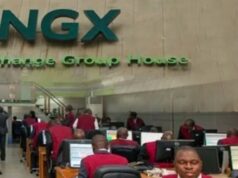Nigerian Governors are seeking a new round of bailout from the Federal Government less than a year after the previous one, according reports quoting close sources to the governors’ forum in Lagos.
The shocking report of the bailout comes less than 10 months after President Muhammadu Buhari’s administration announced a hefty $3 billion bailout for states, mostly ravaged by the excessive looting of their treasury by the governors and cohorts.
“The states Governors are looking for an intervention from the National Economic Council (NEC) for their proposed moratorium on interest payments and principal repayment,” said the source, speaking on condition of anonymity.
“A meeting is scheduled to happen this week for discussions on the issue.”
The States had domestic debt outstanding of N1.6 trillion at the end of Dec. 2014, data from the National bureau of Statistics (NBS), show.
In the earlier bailout a total of twenty-three states had debts of N575.516 billion from 15 banks restructured to FGN bonds.
The restructuring was made using a re-opening of the FGN Bond issued on July 18, 2014 and maturing on July 18, 2034 and had a transaction yield of 14.83 percent.
“Monthly debt service burden has dropped by a minimum of 55% and a maximum of 97%, among the twenty three and interest rate savings for the twenty three states ranges from 3% to 9% p.a,” the Debt Management Office (DMO), said in a report on its website.
Nigeria’s is Africa’s largest oil producer , and its Federal Government generates about 70 percent of its revenue from sale of the commodity.
In some states like Delta State, however oil receipts account for as high as 90 percent of the budget meaning the recent oil price crash is crimping States ability to fund recurrent or capital expenditure.
The price of Brent crude, a global benchmark, has fallen from more than $100 a barrel in mid-2014 to a 13-year low of $27.10 a barrel last month.
Fiscal Revenue available for Nigeria’s three tiers of Government or FAAC allocations fell by 34 percent to N387.8 billion in December 2015 from N521 billion in July.
Recent reports by the NBS show how poor Internally Generated Revenues (IGR) by most sub nationals are.
Only three states (Lagos, Rivers and Delta) accounted for 70.0 percent of total IGR of the 23 states published, while Lagos state alone accounts for 47.0 percent of total IGR.
“More State Governments will default on their obligations this month meaning the request for a moratorium on principal and interest payments will be granted,” Bismarck Rewane, an economist and CEO of advisory firm, Financial Derivatives Company, said.
It is uncertain however how the latest bailout will be structured and its potential impact on banks and other creditors.
The impact of the last restructuring on banks was mixed according to UBA Plc, Nigeria’s fourth-biggest lender by market value, whose loan exposure to Government fell to 2 percent of its loan book after the last states bailout.
“The conversion of State Government loan exposures in Nigeria into Federal Government Bonds improved liquidity and capital adequacy ratio; led to a higher 21.2% tax equivalent yield, lower asset yields/NIM and longer asset duration. This has also resulted in lower loan book size/growth and higher NPL ratio,” the bank said in a presentation of 9 months results to investors.
Most states became heavily indebted from borrowing heavily during the boom years to finance infrastructure projects and political patronage.
Now with the party over state Governors are struggling to find funds to maintain their profligate spending amid a mostly over bloated and unproductive workforce.
Nigeria’s GDP is forecast at 3.8 percent in 2016 from an estimated 3 percent last year (its lowest level in 16 years), the NBS said in a report last week.
The Federal Government keen to jump-start the economy would probably be favourably disposed to another bailout especially since it has the balance sheet to do so.
“An accumulation of arrears at the state and municipal level act as a drag on the economy,” said Aurelien Mali, Moody’s Vice President and Senior Analyst in a Feb 3 report.
“We estimate the general government debt of Nigeria at approximately 15% of GDP, which compares favourably with Ba3 rated peers, whose average debt-to-GDP ratio is 44%. In case of a further shock to Nigeria’s public finances, we expect the federal government to mobilize more resources on its domestic capital markets.”









